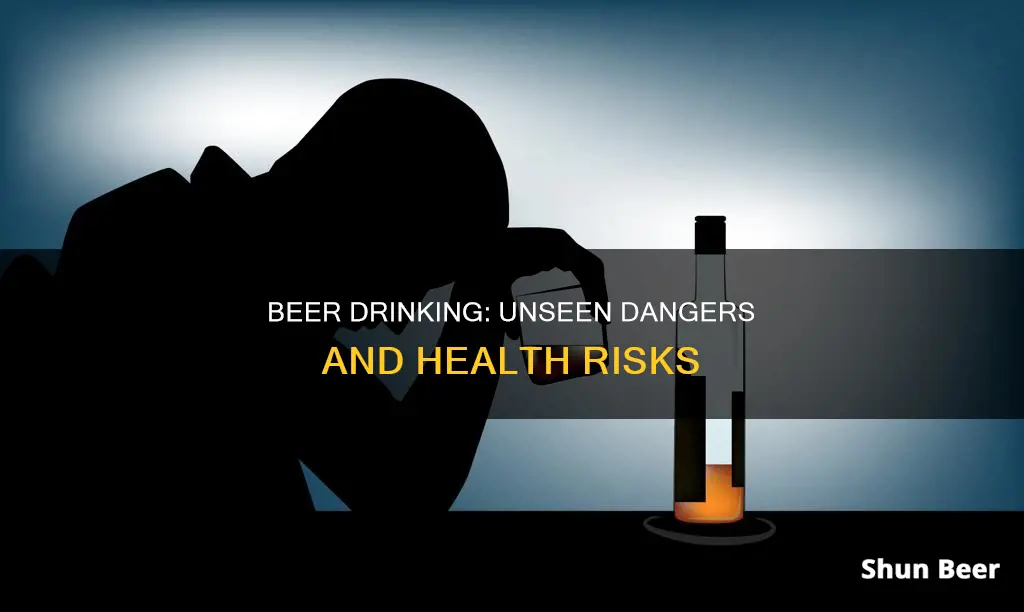
Beer is one of the most popular alcoholic drinks worldwide, but its consumption can have several negative effects on health. While some research has linked beer to benefits such as improved bone density, gut health, and better lipid levels, it's important to note that these benefits may be outweighed by the risks associated with drinking beer, especially in excess.
Drinking beer, especially in large amounts, can cause several issues, including:
- Weight gain and obesity: Beer contains empty calories, which can contribute to weight gain and obesity, leading to various health issues.
- Heart problems: Excessive beer consumption can increase the risk of heart disease. However, moderate drinking may have some benefits for heart health.
- Liver disease: Long-term and excessive beer drinking can damage the liver.
- Alcohol dependency: Drinking beer can lead to alcohol use disorders and dependency.
- Digestive issues: Beer can irritate the stomach and intestines, causing abdominal pain, bloating, and diarrhoea.
- Dehydration: Beer acts as a diuretic, increasing urination and potentially leading to dehydration.
- Increased blood pressure: Regular and excessive beer consumption is linked to high blood pressure.
- Hangovers: Excessive beer drinking can cause hangovers, including symptoms like nausea, dizziness, fatigue, mood swings, and confusion.
- Interference with medications: Beer can interact with certain medications, such as sedatives, antibiotics, and painkillers, leading to adverse effects.
- Malnutrition: Chronic and excessive beer consumption may displace essential nutrients from the diet and interfere with the absorption of vitamins and minerals.
- Allergies and intolerances: Some individuals may have gluten intolerance or allergies to beer, leading to adverse reactions.
What You'll Learn
- Beer can cause malnutrition, as it is high in empty calories and provides minimal nutritional value
- Beer can increase your risk of heart disease
- Beer can worsen your heart health, especially if you already have cardiovascular issues
- Beer can cause digestive issues, such as abdominal pain, bloating and diarrhoea
- Beer can lead to intoxication and hangovers, including memory loss

Beer can cause malnutrition, as it is high in empty calories and provides minimal nutritional value
Beer is a popular alcoholic drink made from fermented sugars and starches derived from barley, hops, water, and yeast. While it has been touted for its potential health benefits, such as improving heart health and preventing chronic diseases, the dangers of excessive beer consumption cannot be overlooked. One of the adverse effects of drinking beer is its propensity to cause malnutrition. This is primarily due to the high number of empty calories in beer and its minimal nutritional value.
Beer is notorious for containing empty calories, which provide energy but little to no essential nutrients. Calories refer to the energy we derive from the food and drinks we consume. Each gram of alcohol contains about seven calories, which is more than the calories provided by protein and carbohydrates. Unlike other foods, beer does not provide any vitamins, minerals, protein, fat, or carbohydrates. Therefore, consuming excessive amounts of beer can easily lead to malnutrition and anemia.
When an individual consumes beer, the body prioritizes processing the alcohol over other nutrients. This competition for limited nutritional resources can deprive the body of essential nourishment. Additionally, alcohol irritates the gastrointestinal system, increasing acid secretion in the stomach. This heightened acid secretion can injure the lining of the small intestine, further hindering the absorption of vital nutrients.
Excessive beer consumption can also suppress hunger, creating a double jeopardy situation where the body receives insufficient nutrients and is unable to effectively utilize the limited nutrients consumed. This can result in a deficiency of essential vitamins and minerals, such as vitamin B1, B12, folacin, and vitamin A, as well as minerals like zinc, magnesium, and potassium.
The impact of beer consumption on malnutrition is particularly concerning for individuals with diabetes. When the liver is occupied with processing alcohol, it affects the body's ability to maintain stable blood sugar levels, putting individuals with diabetes at an increased risk of a blood glucose crisis.
Furthermore, the diuretic effect of alcohol increases urine output, leading to the loss of water-soluble minerals such as zinc, magnesium, and potassium. This can have far-reaching consequences, as zinc deficiency, for example, can interfere with the sense of taste and smell, further reducing dietary intake and exacerbating malnutrition.
In conclusion, while beer may provide a source of calories, it lacks nutritional value and can lead to malnutrition if consumed in excess. It is crucial to prioritize a balanced diet and moderate alcohol consumption to ensure adequate nutrient intake and overall health.
Beer: World's Savior, Ancient Beverage
You may want to see also

Beer can increase your risk of heart disease
Secondly, heavy drinking is linked to high blood pressure, heart failure, and stroke, all of which are serious cardiovascular conditions. Excessive alcohol intake can also contribute to cardiomyopathy, a disorder that affects the heart muscle.
Thirdly, alcohol can interfere with certain medications, including antidepressants and tranquilizers, and increase their side effects. It is important for individuals to consult with their doctor or pharmacist if they are consuming beer while taking any prescription medications.
Finally, beer contains alcohol, a toxic and psychoactive substance. Even moderate drinking is associated with a lower risk of dying from heart disease. However, this relationship is complex and may be influenced by other factors such as income, diet, and physical activity levels. More research is needed to fully understand the mechanisms underlying the link between beer consumption and heart disease risk.
Beer and NFL: What's the Official Verdict?
You may want to see also

Beer can worsen your heart health, especially if you already have cardiovascular issues
Beer can have adverse effects on your heart health, especially if you already have cardiovascular issues. While some studies suggest that drinking beer in moderation can reduce the risk of heart disease, excessive beer consumption can negatively impact your heart health.
Beer contains alcohol, which the liver prioritises as a toxin and works to metabolise first. This slows down the entire fat-burning process, which can lead to weight gain and obesity, increasing the risk of cardiovascular disease. Beer also contains empty calories, which can further contribute to weight gain.
Additionally, beer can cause intestinal inflammation and alter the bacteria in your gut, affecting the lining of the intestine and making the body more susceptible to alcohol-related diseases, including alcoholic fatty liver disease. Beer can also negatively impact your cholesterol levels, with studies showing that total cholesterol levels were higher in beer drinkers than in non-beer drinkers.
For individuals with existing cardiovascular issues, drinking beer can result in an ongoing increase in heart rate, further exacerbating heart problems. Therefore, if you have cardiovascular issues, it is best to avoid drinking beer or consume it in moderation after consulting with your doctor.
Weed vs. Beer: Which Vice is More Damaging?
You may want to see also

Beer can cause digestive issues, such as abdominal pain, bloating and diarrhoea
Beer can irritate the digestive system, causing abdominal pain, bloating and diarrhoea. It is broken down in the stomach, which promotes an increase in digestive juices. Beer also irritates the small intestine and colon, where it is further broken down and absorbed. This can affect the normal speed at which food moves through the digestive tract, leading to abdominal pain, bloating and diarrhoea.
In addition, beer can cause intestinal inflammation and issues within the gastrointestinal tract and the liver. It can negatively alter the bacteria in the gut and permeate the lining of the intestine (leaky gut syndrome), making the body more susceptible to alcohol-related diseases, including alcoholic fatty liver disease.
However, some research suggests that due to beer's fermented compounds, it could potentially benefit gut health.
Beer Drinking in Abu Dhabi: What's the Deal?
You may want to see also

Beer can lead to intoxication and hangovers, including memory loss
Beer is a popular alcoholic drink worldwide, but its consumption can have adverse effects on health. Beer can lead to intoxication and hangovers, including memory loss. Here are some ways in which beer can affect your body and mind:
Intoxication and Hangovers
Excessive beer consumption can lead to intoxication, impairing your judgement, coordination, and motor skills. The alcohol in beer affects your brain, slowing down reflexes and impairing balance, memory, and sleep. The liver, which prioritises breaking down alcohol, can become stressed and cause permanent damage. This can result in a hangover, with symptoms such as nausea, dizziness, fatigue, mood swings, and memory loss.
Disrupted Sleep
Even light drinking can disrupt sleep quality. When you consume beer, your liver metabolises the alcohol, which can result in a restless night.
Weight Gain
Beer can interfere with weight loss efforts. The liver breaks down alcohol first, prioritising it as a toxin. This slows down the fat-burning process. Additionally, the body burns the acetate from broken-down alcohol for energy, and excess fat is stored, contributing to weight gain.
Digestive Issues
Beer can irritate the small intestine and colon, affecting the speed at which food moves through them, leading to abdominal pain, bloating, and diarrhoea. It can also cause intestinal inflammation and alter gut bacteria, increasing the risk of alcohol-related diseases like alcoholic fatty liver disease.
Dehydration
Beer acts as a diuretic, increasing the urge to urinate. This can lead to dehydration, especially for athletes or people who sweat a lot.
Increased Blood Sugar and Interference with Medication
Beer interferes with the liver's process of converting glycogen into glucose, affecting blood sugar levels and causing hunger pangs. It can also interact with certain medications, such as sedatives and antibiotics, leading to side effects.
Cardiovascular Issues
While limited amounts of beer may have some benefits for the heart, excessive consumption can have the opposite effect. Beer causes a temporary increase in heart rate, but over time, it can lead to a persistent increase, negatively impacting those with existing cardiovascular issues.
In conclusion, while moderate beer consumption may offer some health benefits, excessive drinking can lead to intoxication, hangovers, and various health issues. It is important to consume alcohol in moderation and be aware of its potential negative consequences.
Beer and Conception: What You Need to Know
You may want to see also
Frequently asked questions
Drinking beer can have several immediate side effects, including trouble controlling emotions, impaired coordination, slurred speech, and changes in mood. Excessive drinking can also lead to violent activities, risky sexual behaviours, and alcohol poisoning.
Long-term, excessive beer consumption is associated with an increased risk of hypertension, hemorrhagic stroke, weakened immune system, learning and memory problems, alcohol use disorders, and liver disease. It can also contribute to weight gain and obesity, which can lead to various health issues.
Individuals under the age of 21, those who are driving or planning to drive, individuals taking certain medications, and those with specific medical conditions such as alcoholic hepatitis or pancreatitis should refrain from drinking beer. Additionally, those recovering from alcohol abuse or addiction should avoid drinking beer.







